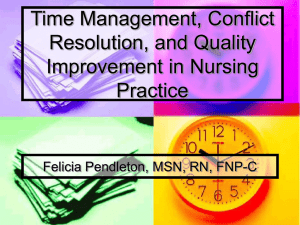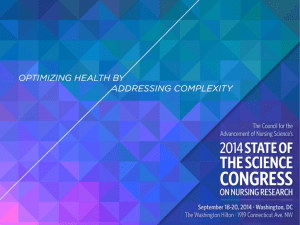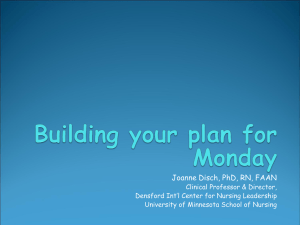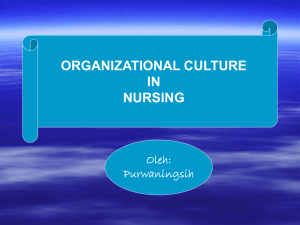Madeleine Leininger - Gena`s Ferris Nursing Portfolio
advertisement
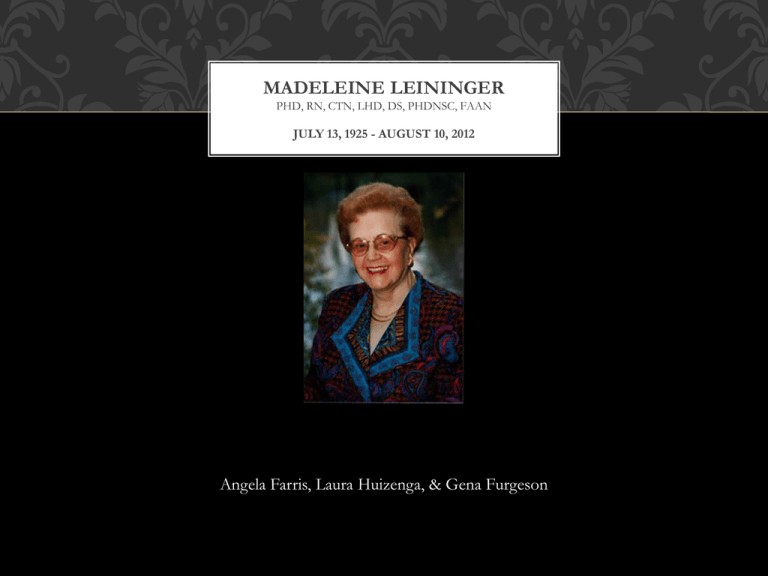
MADELEINE LEININGER PHD, RN, CTN, LHD, DS, PHDNSC, FAAN JULY 13, 1925 - AUGUST 10, 2012 Angela Farris, Laura Huizenga, & Gena Furgeson PURPOSE & TRIBUTE Madeleine Leininger’s educational expertise, international travel, and cultural enrichment through the lives of those she encountered lead to the modern day Transcultural Nursing Theory. A theory which embraces cultural diversity as an advancement for nursing instead of a hindrance. Madeleine’s influence in the educational community advanced nursing as a profession and promoted the development of Doctorate degrees in nursing. Her Sunrise Theory sought to include not only different cultures but variances within cultures that make cultures similar. However, her Culture Care theory is the basis for all of her models as well as her approach to nursing overall, which states: The theory is a holistic, culturally based care theory that incorporates broad humanistic dimensions about people in their cultural life context. It is also unique in its incorporation of social structure factors, such as religion, politics, economics, cultural history, life span values, kinship, and philosophy of living; and geo-environmental factors, as potential influencers of culture care phenomena Tribute The Transcultural Nursing Society will be having a special tribute to Dr. Leininger during its 38th Annual Conference in Orlando, FL - Friday, October 19, 2012 at 7pm. EDUCATION 1948 - Attended St. Anthony’s Hospital School of Nursing in Denver, Colorado. Member of the United States Cadet Nurse Corps in anticipation of World War II. 1950 - Received a Bachelors of Science from Mount Saint Scholastica College in Atchison, Kansas. 1954 - Received Bachelors of Science of Nursing equivalence at Creighton University in Omaha, Nebraska. 1954 - Received Masters of Science in Nursing from The Catholic University of America in Washington, DC. 1959 - Graduate studies at University of Cincinnati, director of the Child Psychiatric Nursing Program, and Associate Professor of Nursing. 1966 - Received a Doctorate degree in Cultural and Social Anthropology at the University of Washington in Seattle, Washington. For an extensive historical perspective and complete circa vitae please visit the Florida Atlantic University – Christine E. Lynn College of Nursing Archives at the link below. http://nursing.fau.edu/uploads/docs/527/Leininger_M_ARC-008_GenDescr.pdf ASSUMPTIONS & POINT OF VIEW Author’s Motivation To discover culturally based care that promotes and/or maintains the health and well-being of individuals, families, or groups. To study the diversities and universalities of care in different cultures; the differences and the similarities Author’s Philosophic Values Regarding Nursing & Knowledge Development Leininger believed nursing was based on caring. Goal to change the focus of nursing from the disease, condition, and symptoms to caring for the patient. To provide “culturally congruent and competent care”. Influences on Author’s Philosophy Leininger used a combination of holistic nursing and anthropology to create her theory. She was not directly influenced by any particular nursing theories throughout her career, although she saw value in each of the nursing theories. DEVELOPMENT OF A THEORY ENLIGHTENED BY EXPERIENCE She practiced psychiatric nursing for children where she was shocked to see the differences in cultures that surrounded her. This opened her eyes to the diversity of cultures. She realized the need for nursing to take the needs of cultures and religious beliefs into account as they care for their patient. Health care without considerations of cultural and religious beliefs does not promote compliance and progression to health. Provided nursing care to children with psychiatric disorders. TRANSCULTURAL NURSING Caring for people with their beliefs and cultural rituals in mind. Committing to helping every culture find a way to benefit their health without betraying their upbringing or religious ideas. Encouraging the patients to an take an active role in their own health plan. Created the Culture Care Theory and the Sunrise Model for nursing care across cultural, gender, and economical boundaries. Founded The Transcultural Nursing Society - “Many Cultures, One World” Founded The International Association of Human Caring For more information on Transcultural Nursing please visit the Transcultural Nursing Society website at the link below. http://www.tcns.org/index.html THE SUNRISE MODEL INFORMATION & CONCEPTS Human Beings “Each individual man, woman, or child” Nursing care must address all basic needs as well as the culturally specific needs of the patient, families, and communities. Environment “All the circumstances, influences, and conditions that surround and affect individuals, families, and groups” Culturally congruent care addresses all aspects of a patient’s environment. Health “A state of complete physical, mental, and social well-being and not merely the absence of disease or infirmity” Transcultural nursing is a holistic approach to care. The patient’s needs, behaviors, and beliefs are addressed. Care also includes the family and community. Nursing “The provision of healthcare services, focusing on the maintenance, promotion, and restoration of health” Transcultural nursing focuses on holistic nursing to include the body, mind, and spirit. It is more than being aware of a person’s ethnicity or religion. Transcultural nursing is having an advanced knowledge of the different cultures of the patients we serve. INFORMATION & CONCEPTS PICTORIAL VIEW INTERPRETATION, INFERENCE, IMPLICATIONS & CONSEQUENCES Clarification of Origins and Range of View The original theory was intended for nursing care and applied to over 100 cultures. Over the years the transcultural approach has been applied to other areas of medicine, social work, and education. This nursing theory was influenced by Dr. Leininger observing children from different cultures. She observed different behaviors, belief, and needs and realized the necessity for a holistic approach to nursing. Content and Situational Use This theory addresses the 4 global concepts: human being, environment, health, and nursing. Transcultural nursing is applicable to all areas of nursing such as pediatrics, geriatrics, surgery, obstetrics, mental health, community health, emergency room nursing, etc. Wherever a holistic approach to nursing is applicable so is transcultural nursing. The transcultural theory of nursing adds to the 4 global concepts by educating nurses on transcultural assessment to include patient’s gender, dress, diet, language, sexual orientation, disabilities, age, socioeconomic status, and religion or faith. CONCLUSION The life and works of Madeleine Leininger will be remembered fondly not only by those directly and indirectly impacted by her presence and care, but for generations of new nurses learning compassionate care in an ever diversifying population. Cultural awareness and sensitivity to the individual needs of the patient increases the comfort of the patient, decreases anxiety and promotes an environment conducive to healing. By developing cultural sensitivities to those around her Madeleine provided a model for all nurses that promotes comfort and healing within our patients, their families, and the communities we serve. Increased cultural sensitivity allows for traditional care to merge with modern medicine. Additional information is available on the Nursing Theories web blog page in a format similar to the current assignment at the link below. http://nursingtheories.blogspot.com/2011/07/leiningers-theory-of-culture-care.html RESOURCES & WEBLINKS 1 OF 3 [Photograph of Madeleine M. Leininger]. (ca.1925-2012). University of Wisconsin: School of Nursing. (2012). Remembering Madeleine Leininger, leader in transcultural nursing and former dean of the UW school of nursing. Retrieved from http://nursing.uw.edu/newsroom/press-releases/remembering-madeleine-leininger-leaderin-transcultural-nursing-and-former-d Allauigan, D., Sarmiento, E., Muñoz, D. N., Sayo, F., de Jesus, G. A., Nuguid, E. L., Barasi, D. M., Alobin, F. K., Herrera, , F. A., Auro-Llenas, A., Reyes, E. L. M., Hilario, D., Resma, E. A., Maco, F., Digap, D., & Sarmiento, E. (2011, July, 11). Leininger’s theory of culture care. [Web blog post and comments]. Retrieved from http://nursingtheories.blogspot.com/2011/07/leiningers-theory-of-culture-care.html angle71054. (2009, November, 22). Buddhist and there practices [Web blog post]. Retrieved from http://allnurses.com/general-nursing-discussion/buddhist-there-practices-440398.html Chitty, K.K., & Black, B.P., (2011). Professional nursing: concepts & challenges. Maryland Heights, MO: Saunders Elsevier Clarke, P. N., McFarland, M. R., Andrews, M. M., & Leininger, M. (2009). Caring: Some reflections on the impact of the culture care theory by McFarland & Andrews and a conversation with Leininger. Nursing Science Quarterly, 22(3), 233–239. doi: 10.1177/0894318409337020. Current Nursing. (2011, October, 17). Nursing theories: A companion to nursing theories and models: Nursing theorists. Retrieved from http://currentnursing.com/nursing_theory/ nursing_theorists.html RESOURCES & WEBLINKS 2 OF 3 Current Nursing. (2012, January, 26). Nursing theories: A companion to nursing theories and models: Transcultural nursing. Retrieved from http://currentnursing.com/nursing_theory/ transcultural_nursing.html Eichelberger, L.W. & Sitzman, K. Understand the work of nurse theorist: A creative beginning. Sunbury M. A. (2011). Jones and Bartlett. Retrieved from http://www.nursingjblearn.com Florida Atlantic University - Christine E. Lynn College of Nursing. (2011). Archives of caring in nursing: General Leininger collection description. Boca Raton, FL: Florida Atlantic University. Retrieved from http://nursing.fau.edu/uploads/docs/527/Leininger_M_ARC-008_GenDescr.pdf Leininger, M. (2002). Founder's focus: Cultural diffusion trends, uses, and abuses in transcultural nursing. Journal of Transcultural Nursing, 13(1), 70. doi: 10.1177/104365960201300113. Leininger, M. (2007). Letter to the editor. Nursing Outlook, 55(6), 271. doi: 10.1016/j.outlook.2007.09.004. Leininger, M. (2007). Theoretical questions and concerns: Response from the theory of culture care diversity and universality perspective. Nursing Science Quarterly, 20(1), 9–13. doi: 10.1177/0894318406296784. RESOURCES & WEBLINKS 2 OF 3 Miller, J. E., Leininger, M., Leuning, C., Pacquiao, D., Andrews, M., Ludwig-Beymer, P., et al. (2008). Transcultural Nursing Society Position Statement on Human Rights. Journal of Transcultural Nursing, 19(1), 5–7. doi: 10.1177/1043659607309147. Munoz, D. N. (2011). Biography and career of Madeleine Leininger. Retrieved from http://www.nursing-theory.org raekaylvn. (2010, November, 10). Religion, culture and nursing [Web blog post]. Retrieved from http://allnurses.com/nursing-and-spirituality/religion-culture-nursing-517282.html Ray, M. A. (2011). A celebration of a life of commitment to transcultural nursing: Opening of the Madeleine M. Leininger collection of human caring and transcultural nursing. Journal of Transcultural Nursing, 22(97). doi:10.1177/1043659610390902. Transcultural Nursing Society. (October 2009). Foundress page: It is time to celebrate, reflect and look into the future: Dr. Madeleine M. Leininger: Founder of transcultural nursing, leader in human care theory and research . Retrieved from http://www.tcns.org/Foundress.html Wiggin, A. (2012). Remembering Madeleine Leininger, leader in transcultural nursing and former dean of the UW school of nursing. Retrieved from http://nursing.uw.edu/newsroom/press-releases/remembering-madeleine-leininger-leader-intranscultural-nursing-and-former-d EXERCISES 1. You are a nurse caring for a practicing Jehovah’s Witness. What information should you include in your cultural assessment of the patient? 2. You are a nurse taking care of a Buddhist patient who is terminally ill and expected to pass soon. What should you discuss with the patient and/or family? ANSWERS Please separate attached document for answers



